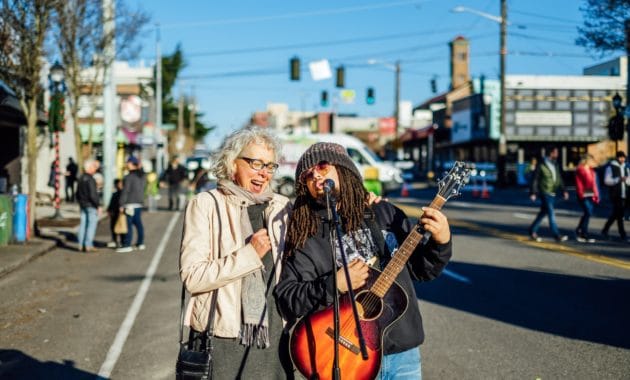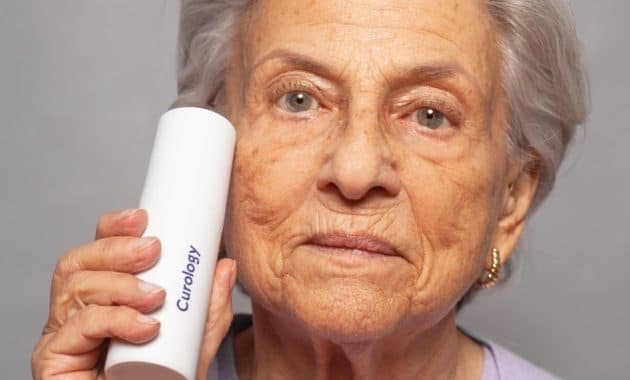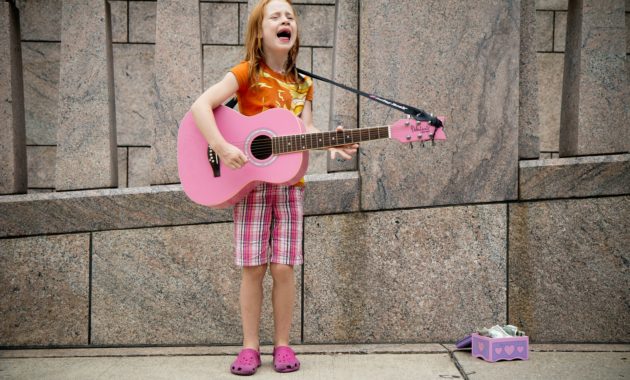
Many people believe that you can only learn to sing successfully as a child, but this is not true.
Studies have shown that adults can pick up new skills just as easily as children can, but they need the right mindset.
For example, adults need to be confident that they can learn a new skill and then focus on the positive aspects of learning it.
By doing this, they will be more likely to succeed.
Table of Contents
- Can you learn to sing at any age?
- Am I Too Old to Learn to Sing?
- The Myths & The Truth
- WHAT IS THE BEST AGE TO START SINGING LESSONS?
- The five barriers to becoming a singer
- Conclusion
Can you learn to sing at any age?

Do you have the talent of a singer like Lady Gaga or any other famous vocalist?
If not, is it even worth taking singing lessons at 52 years old if you’ve always self-proclaimed yourself as “tone deaf” or “not musically gifted”?
The answer is yes.
You can learn to sing at any age and anyone, so long as they have the right mindset.
Many people believe that only children can learn new musical skills because their brains are more malleable than adults’ minds.
But studies show this not to be true: adults are just as capable of picking up new skills, but they need to be more confident in their abilities and focus on the positive aspects.
Am I Too Old to Learn to Sing?

Learning a new skill is never too late.
Some people think that they are “too old for this, or ‘that” but the truth is you can still do it even if you have more experience than others and other responsibilities outside of work and family life.
In fact, the older you get, the more difficult it becomes to learn new skills.
You may feel like your brain has been “set in stone” or that other responsibilities have taken up all of your energy and willpower.
However, if you are determined enough and know what mindset to adopt for success, there is no age limit to learning a new skill.
There is no such thing as “too old” when trying something new, but you will have more obstacles in your way because of mental and physical limitations the older you get.
However, if you take up singing lessons at 52 years old or any other musical instrument, you can still succeed so long as you have the right mindset and are determined enough to make it happen.
The Myths & The Truth
She was listening, picked up the tune, and slew a part that had been giving her trouble for weeks!
I closed my eyes to sing along with her as she melded into our melody.
It had taken so many years of hard work, but now I felt free from all the burden it’d brought us every day.
We were just two people connecting through their love of music in a way they never could before.
I remember a time when we had no audience,
The days of struggling to find something on the internet about singing lessons for adults.
We read all of these articles where they said that you could only learn as a child, and then it’s too late if your brain has already “set in stone”. It was hard to believe that we could learn anything new,
But then I watched this video of a woman who learned to sing at 56.
I was blown away by how much she sounded like an angel in the very next moment and knew it wasn’t too late for us.
She gave me hope that my voice would never be lost forever, no matter how old I was.
I hope that this video can give you the same feelings and show you just how easy it is to learn as an adult, no matter what anyone says!
You may be too young or not musically gifted, but even if your brain has “set in stone”, there’s still a chance for new skills.
It just takes the right mindset with a determined heart.
WHAT IS THE BEST AGE TO START SINGING LESSONS?

Singing lessons should be appropriate for children aged 7-9, but the human voice continues to mature throughout life so that any age can benefit from them.
The best age to start singing lessons depends on the individual, so it may be difficult for someone else to say.
However, there are no “too old” limits when trying a new skill, even if some people say that you should have learned them at an earlier time in your life.
If you want to try and learn to sing, then the best age is comfortable with yourself and secure enough in your abilities.
The five barriers to becoming a singer

You won’t believe what we learned about being a singer!
There are five barriers to becoming one- and singing in tune is only just the tip of the iceberg.
Barrier #1: Pitch and Tuning
The first and most common barrier to singing is pitch.
You might think that once you get the entire tune, it will be easy enough to hit the notes in time with one another- but this assumption couldn’t be more wrong!
Singers of all ranges and skill levels alike need to practice perfect tuning because otherwise, they may not even sing a song correctly or on key?
“Singing ‘in tune’ means singing the note you want”.
For example, if someone wanted their voice at an A5 (or Alto 5), they should make sure when practising scales before any performance that every day can start right by hitting those low notes as accurately as possible so there won’t ever have any.
Barrier #2: Lack of Confidence
I’m shy to sing in front of people.
It doesn’t matter if I get the lyrics wrong or mess up, but once someone points out that it’s not my best performance, they’ll never let me forget it, and I can feel myself shrink into nothingness.
It’s so easy for someone who thinks they’re good to criticise, but the truth is that everyone has weaknesses, and it’s just as hard for them.
The trick is not focusing on what you can’t do- because we all know there are many things in this world that you won’t be able to succeed at no matter how hard you try.
Instead, focus on what is most important- and that’s your happiness.
You’re the only person who can decide if it makes you happy to sing or not, so don’t let anyone make any decisions for you!
Barrier #3: Having a Bad Voice
Can you imagine that many different factors can determine the quality of your voice?
There are 16 things that makeup if a person sounds good or not.
Pitch and tuning is one factor, but there are others such as volume, timbre (tone), speech rate, articulation/pronunciation of words in sentences versus individual syllables within each word; resonance-headroom ratio-volume control -pitch range.
All these combine to determine whether someone has a bad voice or not!
Guess it’s time for me to go into more detail about this beautiful passage on “bad voices”, now isn’t it?!
Barrier #5: Vocal Control
Lack of vocal control is a common problem for many singers.
Vocal range and notes are often broken or not heard correctly because who can’t control the person’s voice well enough to complete phrases without interruption in between words.
If this barrier sounds like it may apply to you, then now is your time to take some steps towards overcoming it!
Conclusion
Learning to sing can be a lifelong pursuit.
Your age may not matter as much as you think it does when singing lessons, but many other factors will make the process more difficult than if you were younger.
If you’ve been wondering about whether or not this is something worth pursuing at your current stage in life, we hope these thoughts and considerations help lead you down the right path for yourself.
The five barriers listed above should give you some food for thought before deciding which voice lessons might work best for your situation.
Or maybe they’ll motivate us to create an entirely new barrier-free program just for older adults! We’d love to hear from any of our readers who have tried their hand at singing at this stage in life.
What are your thoughts and experiences? Let us know by leaving a comment below!